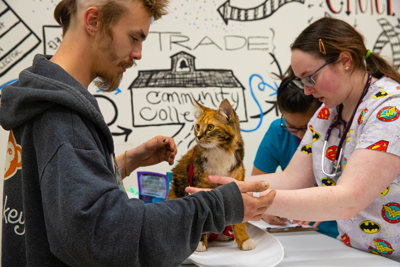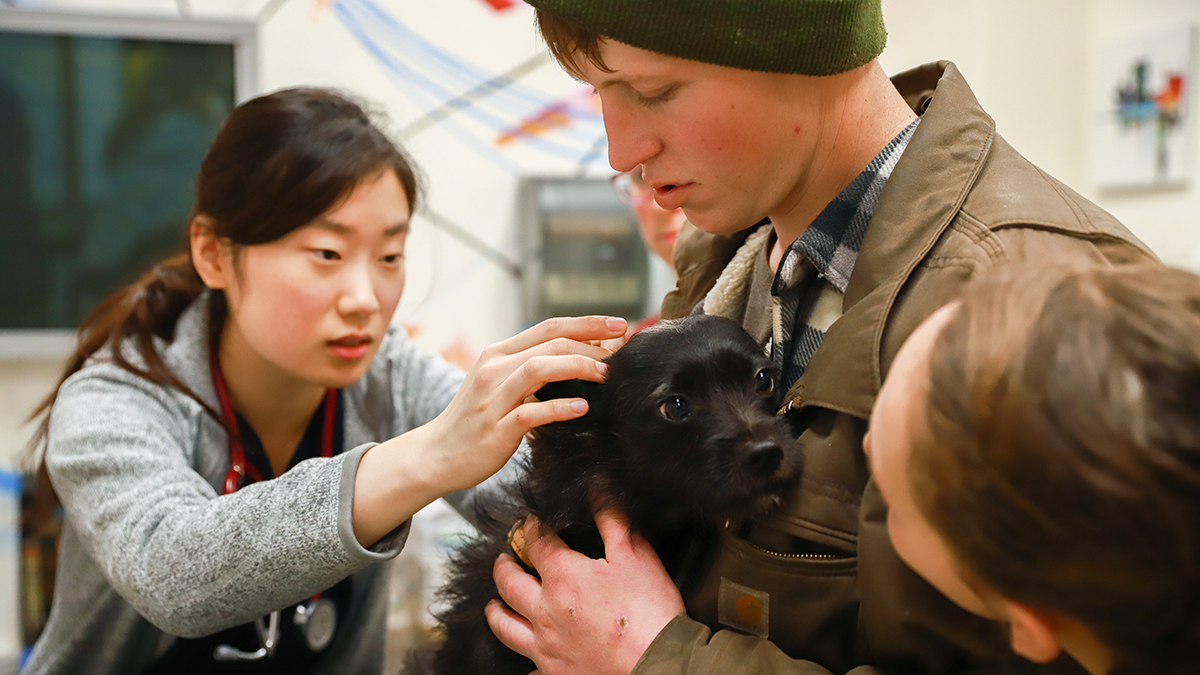Support the One Health Clinic
The UW Center for One Health Research is seeking new funding sources to sustain and expand the clinic. Make a donation to support the clinic.
Washington’s two largest public universities—longtime rivals on the sports field—are teaming up off the field on a new project to improve the health of young adults experiencing homelessness and their pets.
The University of Washington and Washington State University are partnering with two Seattle agencies to launch the One Health Clinic, providing one-stop health care and veterinary care to this vulnerable population.
Key partners are the UW Department of Environmental & Occupational Health Sciences (DEOHS) in the School of Public Health, WSU’s College of Veterinary Medicine, UW Medicine, Neighborcare Health and New Horizons Ministries.
Serving people and pets
A deep bond exists between many homeless youth and their companion animals, with owners often putting the health needs of their pets ahead of their own.
That creates an opportunity to provide health care services for a hard-to-reach population, said Dr. Peter Rabinowitz, DEOHS professor and director of UW’s Center for One Health Research based at DEOHS.
“Our joint human health/veterinary care model allows us to treat humans and their pets as a unit since there are so many overlapping health issues,” said Rabinowitz, also a professor of family medicine in the UW School of Medicine and of global health in the Department of Global Health.
“The aim of this project is to determine the best way to integrate human and animal medical care for people facing homelessness and their pets and to leverage positive aspects of the human-animal bond.”

The UW–WSU connection
The project grew out of a pilot grant from the UW’s Population Health Initiative. Rabinowitz reached across the state to bring in enthusiastic colleagues at WSU.
The partnership comes amid a statewide campaign by the UW and WSU to promote the affordability and impact of public higher education.
“For those people experiencing homelessness, companion animals can provide comfort and friendship," said Bryan K. Slinker, Dean of WSU's College of Veterinary Medicine. "At the One Health Clinic, veterinary and human health students work side by side with their preceptors and community providers to serve these vulnerable animal and human pairs in a truly interprofessional model of care."
Seeking sustainable funding
The One Health Clinic is now open up to two nights per month at New Horizons, a shelter and service provider for youth in downtown Seattle. Neighborcare Health is the human medical provider at the clinic.
The clinic can serve up to seven client-pairs each night. WSU veterinary students work alongside UW medical, nursing and social work students, including members of University District Street Medicine, a student-run volunteer organization.
The One Health clinic could eventually expand to Ballard and could include a mobile clinic, but Rabinowitz says sustainable funding is needed.
Studying One Health linkages
In addition to providing direct health services, Rabinowitz said Center for One Health researchers are studying the impact of having a companion animal on the physical and mental health of people facing homelessness.
The center, which explores linkages among humans, animals and their shared environment, aims to provide research-based recommendations for combined health care, he said.




